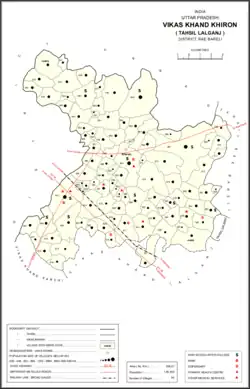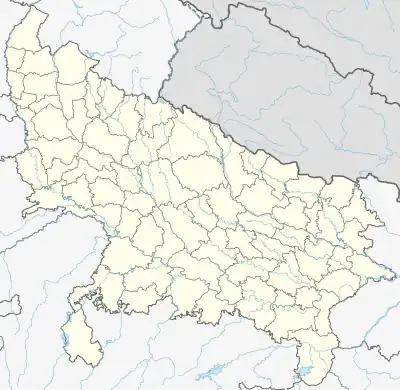Deogaon, Khiron
Deogaon is a village in Khiron block of Rae Bareli district, Uttar Pradesh, India.[2] It is located 12 km from Lalganj, the tehsil headquarters.[3] As of 2011, it has a population of 1,233 people, in 212 households.[2] It has 1 primary school and a primary health centre and does not host a weekly haat or a permanent market.[2] It serves as the headquarters of a nyaya panchayat which also includes 12 other villages.[4]
Deogaon
Deogāon | |
|---|---|
Village | |
 Map showing Deogaon (#591) in Khiron CD block | |
 Deogaon Location in Uttar Pradesh, India | |
| Coordinates: 26.255376°N 80.903342°E[1] | |
| Country | |
| State | Uttar Pradesh |
| District | Raebareli |
| Area | |
| • Total | 1.436 km2 (0.554 sq mi) |
| Population (2011)[2] | |
| • Total | 1,233 |
| • Density | 860/km2 (2,200/sq mi) |
| Languages | |
| • Official | Hindi |
| Time zone | UTC+5:30 (IST) |
| Vehicle registration | UP-35 |
The 1951 census recorded Deogaon as comprising 2 hamlets, with a total population of 473 people (239 male and 234 female), in 104 households and 91 physical houses.[5] The area of the village was given as 1,036 acres.[5] 78 residents were literate, all male.[5] The village was listed as belonging to the pargana of Khiron and the thana of Gurbakshganj.[5]
The 1961 census recorded Deogaon as comprising 2 hamlets, with a total population of 538 people (279 male and 259 female), in 100 households and 96 physical houses.[6] The area of the village was given as 355 acres.[6]
The 1981 census recorded Deogaon as having a population of 795 people, in 135 households, and having an area of 143.66 hectares.[3] The main staple foods were given as wheat and rice.[3]
The 1991 census recorded Deogaon (as "Deo Gaon") as having a total population of 958 people (494 male and 464 female), in 166 households and 166 physical houses.[4] The area of the village was listed as 144 hectares.[4] Members of the 0-6 age group numbered 182, or 19% of the total; this group was 55% male (101) and 45% female (81).[4] Members of scheduled castes made up 27% of the village's population, while no members of scheduled tribes were recorded.[4] The literacy rate of the village was 28% (220 men and 45 women).[4] 210 people were classified as main workers (206 men and 4 women), while 103 people were classified as marginal workers (all women); the remaining 645 residents were non-workers.[4] The breakdown of main workers by employment category was as follows: 104 cultivators (i.e. people who owned or leased their own land); 25 agricultural labourers (i.e. people who worked someone else's land in return for payment); 0 workers in livestock, forestry, fishing, hunting, plantations, orchards, etc.; 0 in mining and quarrying; 16 household industry workers; 6 workers employed in other manufacturing, processing, service, and repair roles; 0 construction workers; 25 employed in trade and commerce; 0 employed in transport, storage, and communications; and 34 in other services.[4]
References
- "Geonames Search". Do a radial search using these coordinates here.
- "Census of India 2011: Uttar Pradesh District Census Handbook - Rae Bareli, Part A (Village and Town Directory)" (PDF). Census 2011 India. pp. 244–61. Retrieved 10 August 2021.
- Census 1981 Uttar Pradesh: District Census Handbook Part XIII-A: Village & Town Directory, District Rae Bareli (PDF). 1982. pp. 130–1. Retrieved 10 August 2021.
- Census 1991 Series-25 Uttar Pradesh Part-XII B Village & Townwise Primary Census Abstract District Census Handbook District Raebareli (PDF). 1992. pp. xxiv–xxviii, 152–3. Retrieved 22 October 2021.
- Census of India, 1951: District Census Handbook Uttar Pradesh (42 - Rae Bareli District) (PDF). Allahabad. 1955. pp. 108–9. Retrieved 22 October 2021.
{{cite book}}: CS1 maint: location missing publisher (link) - Census 1961: District Census Handbook, Uttar Pradesh (39 - Raebareli District) (PDF). Lucknow. 1965. pp. lxvi-lxvii of section "Dalmau Tahsil". Retrieved 10 August 2021.
{{cite book}}: CS1 maint: location missing publisher (link)